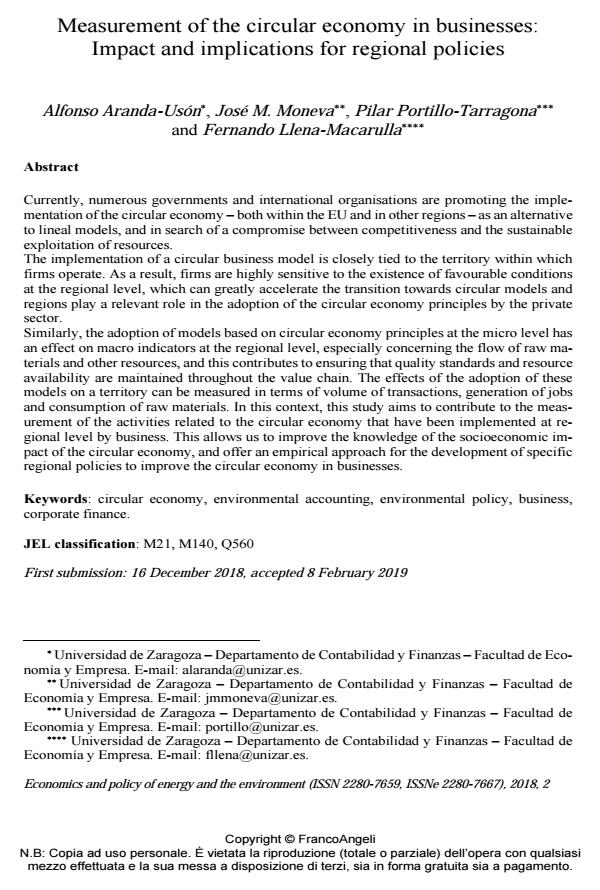Measurement of the circular economy in businesses: Impact and implications for regional policies
Titolo Rivista ECONOMICS AND POLICY OF ENERGY AND THE ENVIRONMENT
Autori/Curatori Alfonso Aranda-Usón, José M. Moneva, Pilar Portillo-Tarragona, Fernando Llena-Macarulla
Anno di pubblicazione 2019 Fascicolo 2018/2
Lingua Inglese Numero pagine 19 P. 187-205 Dimensione file 337 KB
DOI 10.3280/EFE2018-002010
Il DOI è il codice a barre della proprietà intellettuale: per saperne di più
clicca qui
Qui sotto puoi vedere in anteprima la prima pagina di questo articolo.
Se questo articolo ti interessa, lo puoi acquistare (e scaricare in formato pdf) seguendo le facili indicazioni per acquistare il download credit. Acquista Download Credits per scaricare questo Articolo in formato PDF

FrancoAngeli è membro della Publishers International Linking Association, Inc (PILA), associazione indipendente e non profit per facilitare (attraverso i servizi tecnologici implementati da CrossRef.org) l’accesso degli studiosi ai contenuti digitali nelle pubblicazioni professionali e scientifiche.
Currently, numerous governments and international organisations are promoting the implementation of the circular economy - both within the EU and in other regions - as an alternative to lineal models, and in search of a compromise between competitiveness and the sustainable exploitation of resources. The implementation of a circular business model is closely tied to the territory within which firms operate. As a result, firms are highly sensitive to the existence of favourable conditions at the regional level, which can greatly accelerate the transition towards circular models and regions play a relevant role in the adoption of the circular economy principles by the private sector. Similarly, the adoption of models based on circular economy principles at the micro level has an effect on macro indicators at the regional level, especially concerning the flow of raw materials and other resources, and this contributes to ensuring that quality standards and resource availability are maintained throughout the value chain. The effects of the adoption of these models on a territory can be measured in terms of volume of transactions, generation of jobs and consumption of raw materials. In this context, this study aims to contribute to the measurement of the activities related to the circular economy that have been implemented at regional level by business. This allows us to improve the knowledge of the socioeconomic impact of the circular economy, and offer an empirical approach for the development of specific regional policies to improve the circular economy in businesses.
Parole chiave:Circular economy, environmental accounting, environmental policy, business, corporate finance.
Jel codes:M21, M140, Q560
- Stakeholders’ role towards circular economy implementation: a scientometric review Safowaa Osei-Tutu, Joshua Ayarkwa, Gabriel Nani, Dickson Osei-Asibey, Ivy Maame Adwoa Abu, in Construction Innovation /2025 pp.1633
DOI: 10.1108/CI-02-2023-0032 - Methodology for Dimensioning the Socio-Economic Impact of Power-to-Gas Technologies in a Circular Economy Scenario Eva Llera-Sastresa, Luis M. Romeo, Sabina Scarpellini, Pilar Portillo-Tarragona, in Applied Sciences /2020 pp.7907
DOI: 10.3390/app10217907 - Integrating circular economy, digital economy, and social protection policies to drive green business innovation: Insights from Indonesia’s culinary SMEs Suci Megawati, Herdis Herdiansyah, Amir Machmud, Ernoiz Antriyandarti, Sud Sudirman, in Problems and Perspectives in Management /2024 pp.368
DOI: 10.21511/ppm.22(4).2024.28 - How does the circular economy achieve social change? Assessment in terms of sustainable development goals Dolores Gallardo-Vázquez, Sabina Scarpellini, Alfonso Aranda-Usón, Carlos Fernández-Bandera, in Humanities and Social Sciences Communications 692/2024
DOI: 10.1057/s41599-024-03217-9 - Circular Economy and Financial Aspects: A Systematic Review of the Literature Beatriz de Souza Mello Gonçalves, Flávio Leonel de Carvalho, Paula de Camargo Fiorini, in Sustainability /2022 pp.3023
DOI: 10.3390/su14053023 - Indicators for a circular economy in a regional context: an approach based on Wielkopolska region, Poland Justyna Cader, Renata Koneczna, Artur Marciniak, in Environmental Management /2024 pp.293
DOI: 10.1007/s00267-023-01887-w - The role of Green Public Procurement in Circular Economy policies: An international comparison Fabio Iannone, Francesco Testa, Tiberio Daddi, Marco Frey, Giulia Casamento, in ECONOMICS AND POLICY OF ENERGY AND THE ENVIRONMENT 2/2020 pp.149
DOI: 10.3280/EFE2019-002007 - Analytical cost accounting in the context of the circular economy: evolving approaches for managerial decision-making Nadiya Ya. Shkromyda, Yuliia V. Maksymiv, in Regional Economy /2025 pp.102
DOI: 10.36818/1562-0905-2025-2-10 - Bridging circular economy and Islamic economic principles: toward a sustainable economic model Nadia Rahma, Catur Sugiyanto, Akhmad Akbar Susamto, in International Journal of Ethics and Systems /2025 pp.1
DOI: 10.1108/IJOES-01-2025-0038 - Social impacts of a circular business model: An approach from a sustainability accounting and reporting perspective Sabina Scarpellini, in Corporate Social Responsibility and Environmental Management /2022 pp.646
DOI: 10.1002/csr.2226
Alfonso Aranda-Usón, José M. Moneva, Pilar Portillo-Tarragona, Fernando Llena-Macarulla, Measurement of the circular economy in businesses: Impact and implications for regional policies in "ECONOMICS AND POLICY OF ENERGY AND THE ENVIRONMENT" 2/2018, pp 187-205, DOI: 10.3280/EFE2018-002010